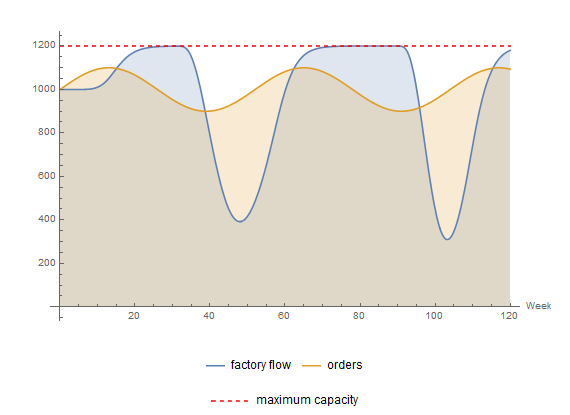Fabricación industrial
Modele nuevos procesos de fabricación antes de su implementación, o procesos existentes para diagnosticar problemas. Mathematica para realizar análisis que incluyan el preprocesamiento y posprocesamiento de modelos, simulaciones y resultados.
Industrial Dynamics
In the SystemDynamics library in SystemModeler, it is possible to create models that allow studying supply chain dynamics.
From Demand to Supply
Let's take a look at a manufacturing industry characterized by a seasonal demand, such as an outdoor furniture manufacturer, with a maximum production capacity of 1,200 items/week.

The top model in the hierarchy consists of the three major components—retail, distribution, and factory—as well as an input that corresponds to the customer orders placed at the retailer. Since this is an industry where demand fluctuates depending on the season, the orders are described with a sine wave.
The Interplay of Orders and Factory Flow
As the number of orders fluctuates over the year, so does the flow of items to and from the factory.

Even though the number of orders never reaches the maximum capacity of 1,200 items per week, the factory still needs to operate at full capacity during some periods.
Stock Inventory
The three different links in the chain, from production to customer, usually don’t hold the same size of stock. In this example, the retailer has the largest stock and the factory the smallest. As with order and factory flow, the different stocks fluctuate in a coordinated manner.

Stock fluctuations over the year.
Wolfram System Modeler
Probar
Comprar
System Modeler está disponible en inglés
y japonés
para Windows, macOS y Linux »
¿Preguntas? ¿Comentarios? Contacte a un experto de Wolfram »